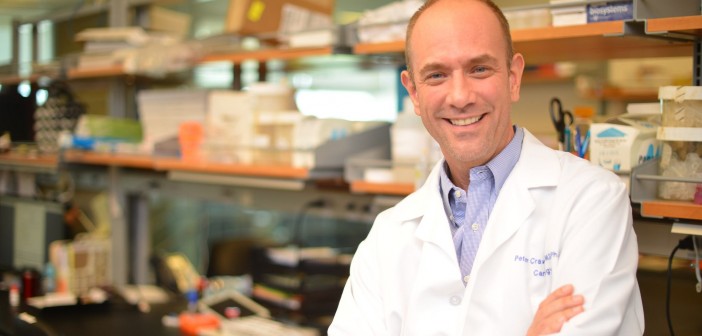The director of SBP’s Cardiovascular Metabolism Program was recently elected into a pre-eminent honor society for physician-scientists. Peter Crawford, MD, PhD, was one of 74 medical researchers whose nominations to the American Society for Clinical Investigation (ASCI) were accepted in 2016. This distinction is conferred only on investigators who have made significant scientific advances prior to the age of 50.
“Working as both a physician and a basic researcher—understanding disease from the patients’ perspective while also working in the lab towards better ways to help them—is a privilege,” said Crawford. “The ASCI is a pillar of the community of physician-scientists, so it’s a great honor to join and serve among them.”
Crawford’s lab investigates how an understudied metabolic pathway contributes to obesity and diseases of the heart muscle. This interest was sparked by unexpected results during his postdoc with Jeffrey Gordon, MD, at Washington University School of Medicine in St. Louis. While examining how changes in gut microbes affect metabolism in the host, he observed variations in the consumption of ketone bodies—the products of ketogenesis—by the heart.
“Ketogenesis was historically thought of as a way to burn excess fats, but since other aspects of fuel metabolism are connected to disease, and ketone metabolism is so dynamic, it seemed like it had to have functions relevant to disease that we had not recognized,” explained Crawford.
His team’s work over just the last six years has borne this out. For example, they showed that ketogenesis helps prevent fatty liver disease, pointing to a new strategy to counteract liver damage associated with obesity and decrease risk of liver cancer. They also showed that ketone bodies protect against maladaptive changes in the size and structure of the heart following injury such as a heart attack. These results could lead to therapies that help the heart recover by promoting optimal ketone body metabolism.
“Recognition from the ASCI reinforces something that we as investigators all seek –that we are working in a domain that has real promise to heal the sick,” added Crawford. “We’re committed to seeing our work through to translation—making an impact on the treatment of obesity and heart disease will be the best reward.”
